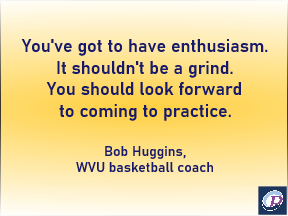
2 min readDon’t Forget To Remember
by Guy Gage | March 8, 2020 | Business, Leadership, Personal Management

From THE Coach
Last Saturday, I listened to Coach Bob Huggins’ post-game interview after winning the last game of the regular season (beating #4 Baylor). He said some things that reminded me how important it is not to forget to remember.
“[Before the game,]We had two of the best practices we’ve had in a very long time. [Players] were enthusiastic; had bounce in their step.”
Huggins has been around for a long time and is one of the winningest coaches in NCAA history. He knows something you need to know.
What Stress Really Is
When enduring long seasons, your whole body experiences stress: mental stress that impacts your ability to concentrate. Physical stress that brings on fatigue. Emotional stress that adversely affects your attitude. Under normal circumstances, you reach into your mental, physical and emotional reserves to keep going. This is called resilience and it works like a muscle. The more you use it, the stronger it gets.
But there are times when you exceed those reserves and you find yourself in a state called allostatic overload, which means you have exceeded your reserve capacity and you have little else available to adapt to the situation at hand. The overload takes you from persevering through challenges (powering through normal stress) to a state of survival (suffering from distress).
In order to prevent yourself from going over the edge, you should do what military special ops and athletes in a long season are trained to do. Instead of giving up, or just going through the motions, you can remember. But remember what?
Remember This
You are wired to execute on your thought patterns. You do what your brain tells you to do. When you think you are at the end and can’t do anymore, guess what? You can’t. Your body and mind shut down and conform to your thoughts. But if you remember that you are in the midst of what you love to do and there is a reason for it, everything changes.
From the interview, Huggins commented on how his players could be enthusiastic after a long, grueling and sometimes frustrating season.
“Go into the locker room and ask them. They love basketball.”
Your profession is what you went to school to do. It’s what you’ve invested yourself in becoming. It’s work that you enjoy.
When you remember that you really like what you do, your whole demeanor upgrades. You find that your energy, determination and enthusiasm return. Whether you’re running a marathon, in an intense busy season at work or a long athletic season of hard practice, if you forget why you do it, you’re toast.
What To do Next
Beginning now, remember that this is the career you chose and that you love what you do. Yes, you’re approaching overload, so counter it by rehearsing, “I love what I do. This is my dream career. My work is important and makes a difference. Yes, I love what I do.” That’s how people become champions. They don’t forget to remember.
Read Related Blogs:
Igniting the Spark
In February, a senior manager attended our Leading Your Team course. The program explores how managers can better understand and lead their team members by recognizing different working and relational styles. For him, this experience marked a turning point. He walked...
Leading with Certainty: Anchoring Leadership in Vision and Values
Effective leadership is grounded in the certainty of what is known: the long-term vision, enduring values, and guiding principles that define an organization’s identity. In a recent coaching conversation with a senior leader navigating a period of rapid change, this...
Courageous Leadership: Understanding Fear in Times of Change
In the midst of writing last week’s Monday message, I was preparing to facilitate a session titled Courageous Leadership: Navigating Change, Fear, and Uncertainty. During that session, one of the attendees questioned the use of the term fear. She didn’t feel that fear...


